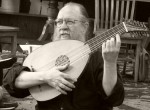Column Name
Title
Lutenist Patrick O’Brien, a guru in the highly specialized field of historical plucked instruments, died on July 16 in New York City of complications from a cerebral hemorrhage. He was 67. O’Brien possessed a comprehensive working knowledge of the technique, repertoire, and performance practice of 14th- to 19th-century string instruments. For nearly 50 years, he played and taught Renaissance and Baroque lutes, early guitar, archlute, vihuela, cittern, theorbo, and early harp. Among his former students are Daniel Swenberg and Charles Weaver, who are taking over his Juilliard classes.
Body
O’Brien joined Juilliard’s Historical Performance faculty in 2012 and also taught at Sarah Lawrence College, Mannes College the New School for Music, New York University, Queens College, Stony Brook University, and SUNY Purchase. He was a former board member of and advisor to the Lute Society of America. He also helped found the New York Continue Collective, which held its first sessions in his teaching studio. O’Brien, who worked with violinists, cellists, and pianists in addition to guitarists and lutenists, also taught at guitar and harp festivals in the U.S., Canada, and Europe.
Lutenist Paul O’Dette, who had collaborated with O’Brien on a method for 16th-century lute, told The Journal by phone that O’Brien “had the most thorough understanding of lute and classical guitar technique based on human physiology.” O’Dette, who is a lute professor at the Eastman School of Music, added that his former collaborator, who was also an expert in hand anatomy and musicians’ injuries, “was immediately able to pinpoint any mechanical flaw in either hand.” O’Brien also recorded with the King’s Noyse, the Harp Consort, and the Freiburg Baroque Orchestra; with Dennis Cinelli, he recorded the 19th-century guitar duets of J.K. Mertz.
O’Brien was born in Brooklyn in 1947. Early in his career he played and sang folk and popular music as well as jazz and contemporary classical guitar, in part due to a lack of historically informed early-music programs. He made his Carnegie Hall debut as a lutenist in 1978.
When Benjamin Sosland, administrative director of Juilliard Historical Performance, emailed the Juilliard community about O’Brien’s death, he described him as “the definition of a free spirit” and noted that “the world of music is now poorer without him.” O’Brien is survived by his wife, Mary Lou, and daughter, Elanor.





